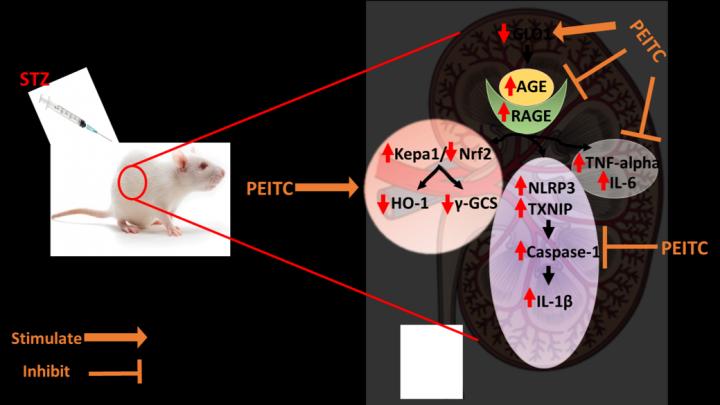Phenethyl isothiocyanate, derived from watercress and other cruciferous vegetables, shows benefits in rats

Credit: Image courtesy of Mohamed El-Sherbiny, AlMaarefa University.
New research conducted in rats suggests a compound that gives some cruciferous vegetables their pungent taste could help to reverse kidney problems associated with diabetes.
It is estimated that about one-quarter of people with diabetes will eventually develop diabetic nephropathy, a gradual loss of kidney function eventually requiring dialysis. The condition is a leading cause of chronic kidney disease in the U.S. and is also associated with a high risk of heart disease. There is currently no cure.
For the new study, researchers assessed the effects of phenethyl isothiocyanate (PEITC) in rats with diabetic nephropathy. PEITC is found in several types of vegetables but is most concentrated in watercress.
“Our study provides, for the first time, evidence that PEITC might be effective as a naturally occurring agent to reverse serious kidney damage in people with diabetes,” said lead study author Mohamed El-Sherbiny, PhD, a postdoctoral fellow at AlMaarefa University in Riyadh, Saudi Arabia. “Our study introduces mechanistic evidence of how PEITC might manage kidney injury associated with diabetes by targeting multiple interconnected pathways involved in diabetic nephropathy, including inflammation, glycation and oxidative status.”
El-Sherbiny will present the research at the American Association for Anatomy annual meeting during the Experimental Biology (EB) 2021 meeting, held virtually April 27-30.
Previous studies have suggested sulforaphane, a related compound in cruciferous vegetables, also helps reduce diabetes-associated kidney damage. The new study bolsters the evidence that eating more vegetables containing these compounds could help people with diabetes to stave off kidney problems.
“PEITC seems to manage one of the most serious and painful diabetic complications. Luckily, PEITC is naturally present in many dietary sources, importantly watercress, broccoli, turnips and radish,” said El-Sherbiny.
Since the research was conducted in animal models, further studies will be needed to confirm the findings and understand how the results could translate to new treatments or dietary recommendations for people with diabetes.
El-Sherbiny will present this research from 3:45-4 p.m. Thursday, April 29 (abstract). Contact the media team for more information or to obtain a free press pass to access the virtual meeting.
Images available.
###
About Experimental Biology 2021
Experimental Biology is an annual meeting comprised of thousands of scientists from five host societies and multiple guest societies. With a mission to share the newest scientific concepts and research findings shaping clinical advances, the meeting offers an unparalleled opportunity for exchange among scientists from across the U.S. and the world who represent dozens of scientific areas, from laboratory to translational to clinical research. http://www.
About the American Association for Anatomy (AAA)
AAA is the professional home for an international community of biomedical researchers and educators focusing on the structural foundation of health and disease. Founded in 1888, the Association advances anatomical science through research, education, and professional development. http://www.
Find more news briefs and tipsheets at: https:/
Media Contact
Nancy Lamontagne
[email protected]



